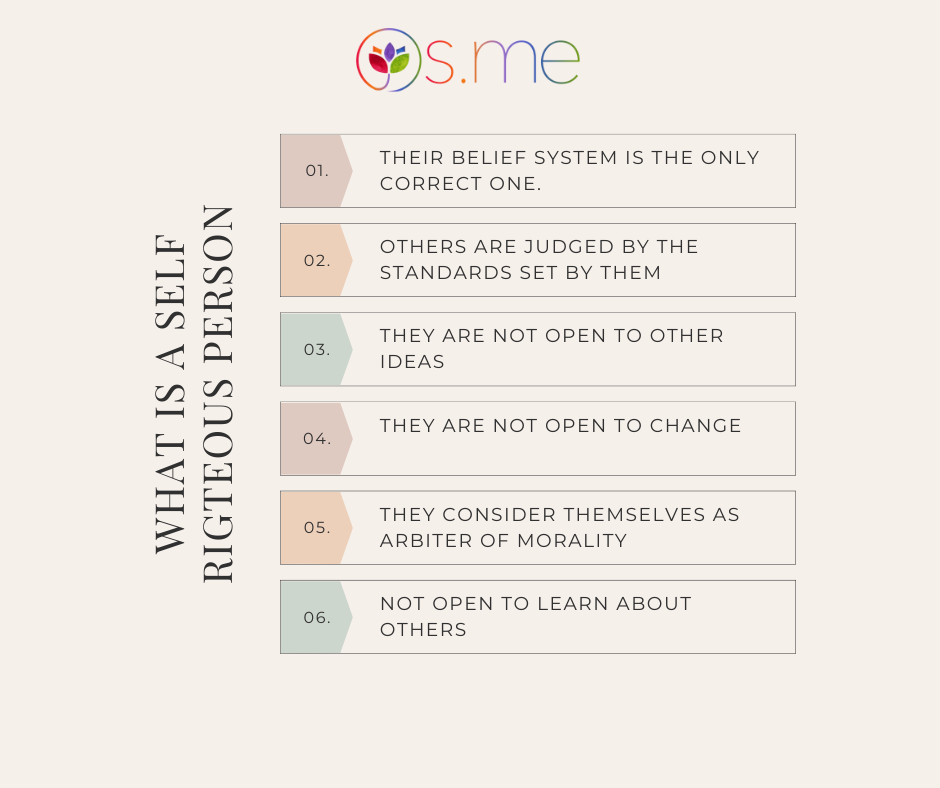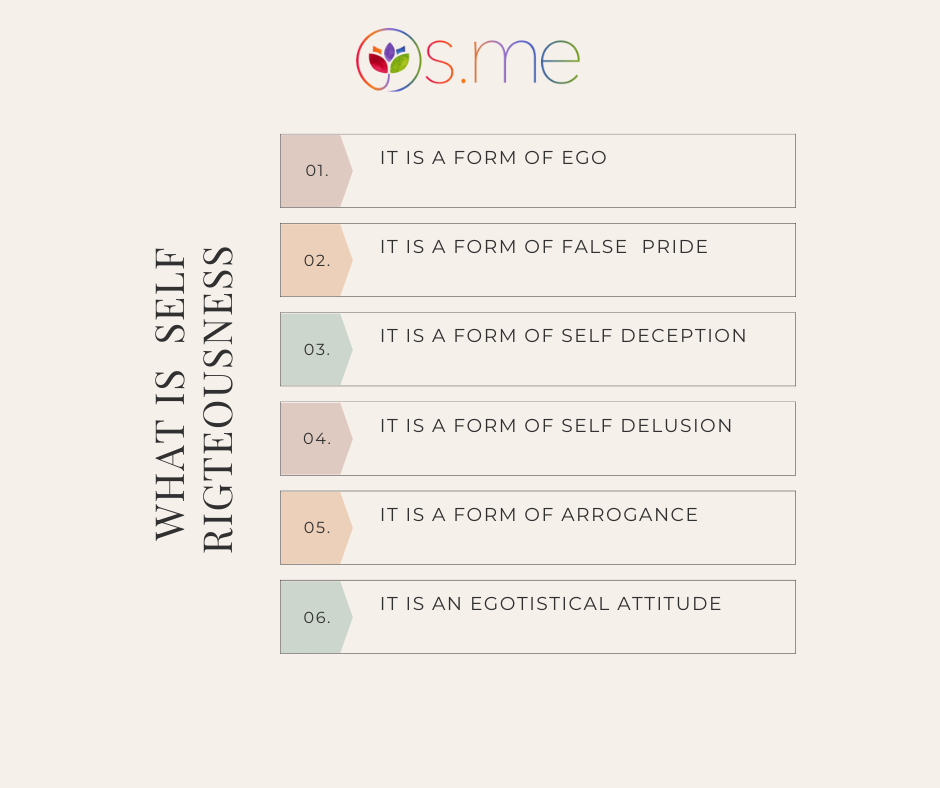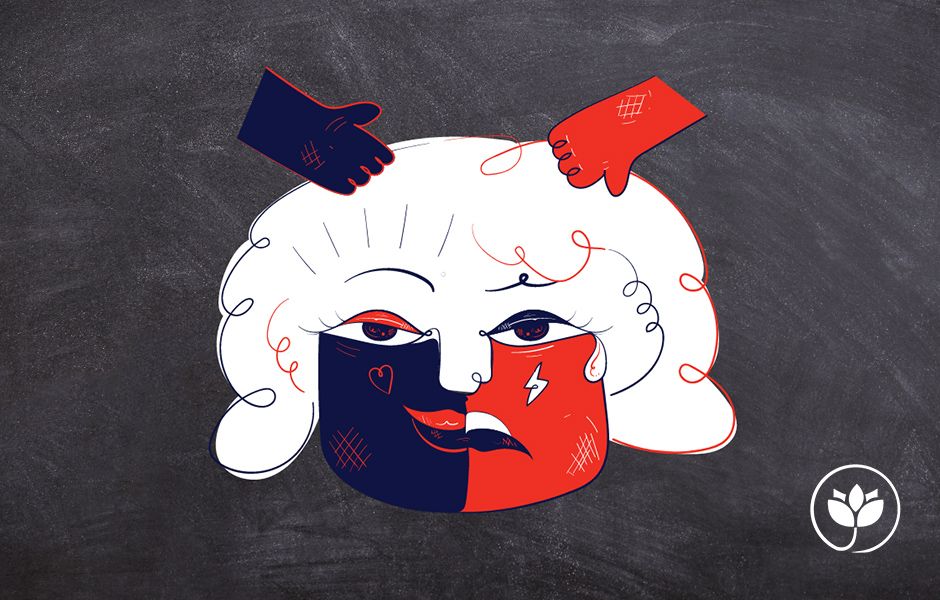
Self-righteous toxicity
There’s nothing wrong with holding yourself to a high standard. It’s admirable to want to live up to your moral code. But there’s a fine line between being principled and being self-righteous. And unfortunately, it’s all too easy to cross that line without even realizing it.
What is a self-righteous person?
Self-righteous people believe they are always right and their way is the only correct way. They think they are superior to others and look down on those who don’t share their beliefs or lifestyle choices.
They are often very vocal about their opinions. They need to tell everyone else what they should do and how they should live. They lecture others and try to force them to see things from their point of view. And if someone disagrees with them, they can get quite angry.

Definition and meaning of self-righteous
: convinced of one’s righteousness, especially in contrast with the actions and beliefs of others: narrow-mindedly moralistic
Source: Merriam Webster
It is often due to conditioned morality.
Life is not black-and-white. You really do not need some religion, somebody else, to tell you what is right from wrong, good from bad, because they talk in absolute terms, whereas life is anything but absolute. If you get caught up in the absolute rights and wrongs, you will only end up more guilty. Set yourself free. By no means am I saying you go around breaking the rules just because they are there, but I am suggesting that you examine the rules you have imposed on yourself. The path of compassion is often worth it.
Source – Is morality absolute?
Is self-righteousness positive or negative?
The problem with self-righteous people is that it’s a very toxic attitude. It can be very damaging to both personal relationships and professional relationships. It can be hard to work with or associate with someone who is always so sure of themselves and their beliefs. Self-righteousness is not a positive quality.
It’s a very negative trait. It can make people seem arrogant and unapproachable. It can also lead to division and conflict.
And yet, for some reason, we often see self-righteousness as a positive trait. We admire people who are confident in their beliefs and who stand up for what they believe. We see them as being principled and strong-willed. And while those qualities can undoubtedly be admirable, they can also bode well for a self-righteous attitude.
How do I know if I am self-righteous?

If you find yourself constantly lecturing others and trying to convince them to see things your way, then there’s a good chance you’re being self-righteous. If you get angry or upset when someone disagrees with you, that’s another red flag. And if you think you are always right and that your way is the only correct way, then chances are you’re crossing over into the territory.
What is self-righteous indignation?
Self-righteous indignation is a state of mind in which one believes that they are morally superior to others.
Self-righteous indignation can lead to people putting others down or making them feel bad about themselves for no reason. For example, if someone does not believe the same way as someone else, they may be labeled ignorant or stupid by those who hold such views.
In addition, self-righteous indignation can cause one to become angry when others don’t share their opinions. This anger may lead to arguments and disagreements between people with different views on politics, religion, or personal beliefs.
When does confidence become arrogance?
There’s nothing wrong with being confident in your own beliefs. It’s important to have convictions and stand up for your beliefs. But there is a point at which confidence becomes arrogance. And that’s when you start thinking that you’re always right and that everyone else is wrong.
It’s important to remember that we all have different perspectives and that there is often more than one correct answer. We can all learn from each other, and it’s essential to be open to new ideas and different points of view. Otherwise, we risk becoming arrogant.
The illusion of moral superiority
It is the belief that one’s own moral standards are superior to those of others. This belief can lead to a feeling of being morally superior and may result in a tendency to judge others harshly.
The illusion of moral superiority is related to self-esteem, which refers to how much we value ourselves. When we believe our actions are morally correct, we feel good about ourselves and our lives. We also tend to think that others should see things the same way we do, especially if we feel strongly about an issue. However, if someone disagrees with us on an important topic, it can be hard not to feel like they have done something wrong or are somehow inferior.
In addition, when people believe their actions are morally correct, they may feel justified in judging others harshly based on their actions alone — even if they don’t know all the facts about the situation or person involved. For example, if someone believes abortion is wrong because it violates God’s will, they might judge someone who has had one as being “immoral” or “wicked.”
NCBI published a research study on the illusion of moral superiority.
The irrationality of moral superiority was borne out of the ubiquity of virtue—almost everyone reported a strong positive moral self-image—and individuals’ ignorance of this ubiquity when making judgments of the average person. Indeed, neglecting the prototypicality—and thus cue validity—of one’s own self-judgments may signal an error in inductive reasoning (Krueger et al., 2013).
Of course, self-judgments themselves may not accurately reflect genuine moral character—for example, compared to behavior (Back & Vazire, 2012). However, given the substantial degrees of freedom in what constitutes moral behavior (Alicke & Govorun, 2005; Graham et al., 2016), it seems probable that claims of positive moral character are equally legitimate (or illegitimate) for a large majority of people. In most cases, it would be difficult to make the argument that one moral self-image is more genuine than another.
A fallacy thus arises when individuals do not apply to others the same degrees of freedom they invoke in their moral evaluation of themselves (Dunning et al., 1989). Insofar as this fallacy compromises the accuracy of social judgment and perception, it may be deemed erroneous (Heck & Krueger, 2015).
The Illusion of Moral Superiority – PMC
How can I avoid being self-righteous?
The key is to be aware of it. When discussing your beliefs, pay attention to how you interact with others and your language.
If you are getting judgmental or lecturing others, try to back off and take a step back. Remember that we all have different opinions and that it’s okay to agree to disagree. We can still respect each other even if we don’t see eye to eye on everything.
It’s also important to be humble. Be willing to admit you’re mistaken and be open to learning from others. Don’t think that you know everything – because you don’t. We can all benefit from listening more and talking less.
What causes a person to be self-righteous?
Several things can cause a person to become self-righteous. It can often stem from a sense of insecurity or inferiority. When someone constantly tries to make themselves look better by putting others down, that’s usually a sign of self-righteousness.
People become self-righteous when they lack knowledge or understanding about a specific topic. They may feel they need to defend their beliefs at all costs, even if they don’t know much about the subject. And finally, self-righteous toxicity can often result from religious zealotry or political extremism.
When someone is so devoted to their beliefs that they lose sight of anything else, they start seeing signs of self-righteousness. It is dangerous because it can also lead to loneliness and depression.
It’s essential to be aware of the signs of self-righteousness and to avoid being judgmental or arrogant. We can all benefit from listening more and talking less. When we’re open to different points of view, we can learn from each other and work together to find the best solution – instead of just arguing about who’s right and who’s wrong.
What are the consequences of being self-righteous?
Self-righteous toxicity can lead to conflict and hurt feelings if you’re not careful. And when people get too wrapped up in their beliefs, they can sometimes lose sight of what’s essential.
Self-righteous toxicity can also be dangerous when taken to the extreme. When people become so convinced that they’re right that they’re willing to fight or even kill for their beliefs, things start to go too far. Radicals and extremists often act out of self-righteousness, which can have devastating consequences because it often leads to conflict and hurt feelings.
Steps to rise above self-righteousness.
Our feelings and emotions, particularly negative ones, stem from provocation. The impulse trigger may be external or internal, but if nothing or no one can provoke you, you will never find yourself saying or doing the undesirable. Someone’s statement, actions, or a thought in your mind can be the provoking agent.
Source – What provokes you?
- Understand that you are not perfect, and neither is anyone else
- Don’t judge others based on your standards
- Be aware of the signs
- Avoid being judgemental or arrogant
- Listen more and talk less
- Be open to a different point of view
- Don’t be afraid to admit when you are wrong
- Don’t be afraid to apologize when you make a mistake.
It’s not always easy to see ourselves objectively. Still, it’s worth taking a step back and evaluating whether we have fallen into the trap of thinking we are better than others. If you find that you are struggling with being one, know that there is hope. By following these steps, you can rise above this harmful attitude and live a more fulfilling life free from the chains of arrogance. Have you ever been accused of being self-righteous? Share your story in the comments below! Or ask a question to os.me community.









Comments & Discussion
1 COMMENTS
Please login to read members' comments and participate in the discussion.